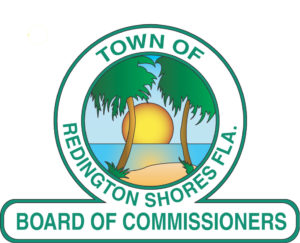Excavations & Hatchling Releases
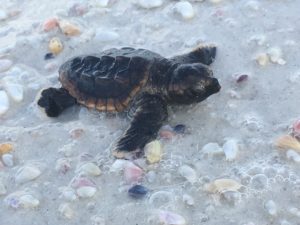 Blue Earth Research Group and Sand to Sea bring two new exciting and unique programs to Pinellas County.
Blue Earth Research Group and Sand to Sea bring two new exciting and unique programs to Pinellas County.
Each spring and summer loggerhead female sea turtles make a brief trip to our shores to nest. Approximately two months later, under the cover of darkness, up to 150 hatchlings emerge from each deep sandy nest in a mad dash across the beach to reach the safety of the Gulf of Mexico.
We are offering the public an opportunity to observe excavations of recently hatched sea turtle nests and releases of hatchlings recovered from these nests July through September.
EXCAVATIONS
An “excavation” is the process completed by biologists to document what remains in the nest 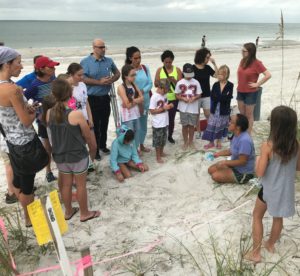 after a natural hatching has occurred. During an excavation, the biologists will dig up the nest, count empty eggshells, and un-hatched eggs. Live and dead hatchlings are occasionally found during these excavations. This is part of the life cycle, however, please be aware of this possibility if bringing children. While the biologists perform their examination of the nest, they will present a program on sea turtles and share what they have found. Nest excavations are an important way for the State to collect valuable data on sea turtle hatch and emergence success rates.
after a natural hatching has occurred. During an excavation, the biologists will dig up the nest, count empty eggshells, and un-hatched eggs. Live and dead hatchlings are occasionally found during these excavations. This is part of the life cycle, however, please be aware of this possibility if bringing children. While the biologists perform their examination of the nest, they will present a program on sea turtles and share what they have found. Nest excavations are an important way for the State to collect valuable data on sea turtle hatch and emergence success rates.
Nest excavation programs will be held on the beach in the morning hours. You can make a reservation to be notified when excavations will occur. Due to the unpredictability of sea turtle hatchings, notice of these excavations programs will usually occur only three days in advance. At that time you can purchase tickets to attend, and you will be sent information about where to meet.
HATCHLING RELEASES
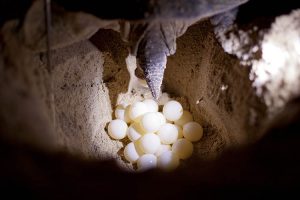
Hatchling releases begin with a presentation, followed by a trip to the beach to watch the release of baby sea turtles into the Gulf of Mexico! These hatchlings are collected from excavations. Hatchling releases will occur from July through September. Releases will take place 30 minutes after sunset. These releases cannot be scheduled in advance because we cannot predict exactly when a sea turtle nest will hatch.
You can make a reservation to be notified when hatchling releases will occur. Since we have to release hatchlings the evening immediately after recovery, notice will usually occur 8 hours in advance. At that time you can purchase tickets to attend, and you will be sent information about where to meet.
SIGN UP FOR NOTIFICATIONS NOW!
FAQs
Will I be able to touch sea turtle hatchlings?
Unfortunately, we cannot allow anyone to touch the hatchlings. Only personnel who are authorized by federal and state permits, can handle the hatchlings.
Why must the hatchlings crawl on the beach – why not just release them directly into the water?
We allow the hatchlings crawl on the beach for several reasons: it helps them “wake up,” it allows us to assess each hatchling’s ability, it allows hatchlings to crawl down the beach as they would in nature, it may be essential to the imprinting process which will help them find their way back to these beaches decades later to lay their own eggs.
Why are releases at night?
Releases occur at night as they would naturally. This allows hatchlings the cover of dark to avoid predators.
Can I take pictures or video?
Unfortunately, no photography or lights are allowed during a hatchling release. Lights, even from a lit cell phone screen, disorient the hatchlings and can even reduce their chances of survival by causing them to wander and burn off their limited energy reserve. When you arrive at the release site, please make a point to ensure any flash or lights are turned off on all cell phones, cameras, and video equipment.
Is there anything else I need to know about attending a release?
• No white in sight… Hatchlings rely on the celestial light shining on the water and the white foam of the waves to help them find their way. White clothing or shoes can confuse them, so please avoid wearing white.
• Plant your feet! As the hatchlings get close to the surf’s edge, waves can sweep in and quickly carry them into the crowds of visitors watching the release. Please do not lift your feet, you could accidentally step on a hatchling! PLEASE keep your feet planted in the sand and stand very still. Our trained personnel will come and find any hatchlings that may have been swept into the crowd and bring them back into the safe zone.
• It’s hot out there! Even though public releases take place after sunset, the high humidity and summer heat can still be intense. Please stay hydrated. Your safety is very important to us!
Click here to learn about the life history of sea turtles.
Partnering together for conservation

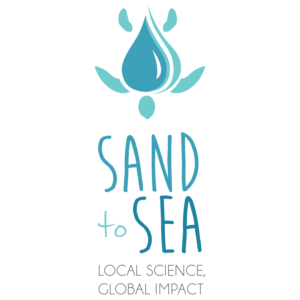
Hosted by

